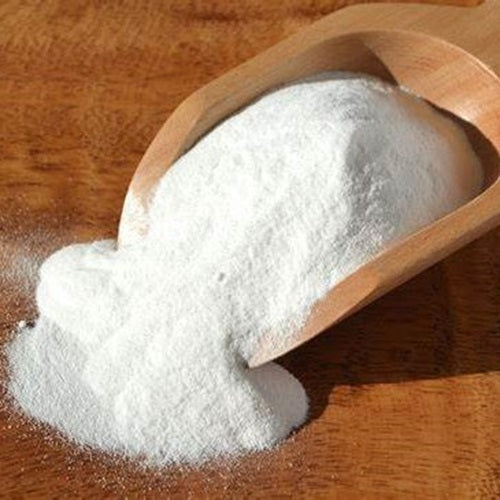Menu
LOOKING FOR BULK INGREDIENTS PRICING?

Benefits of Sodium Bicarbonate - Wholesale B2B Bulk Suppliers
Sodium Bicarbonate: The Versatile Compound in Your Pantry
Sodium bicarbonate, commonly known as baking soda, is a simple yet incredibly versatile compound with a wide range of applications, from cooking and cleaning to healthcare and science experiments. Chemically represented as NaHCO₃, it is a white, crystalline powder with mild alkaline properties. Let’s dive into its origins, benefits, and various applications in everyday life.
What Is Sodium Bicarbonate?
Sodium bicarbonate is a salt composed of sodium ions (Na⁺) and bicarbonate ions (HCO₃⁻). This compound occurs naturally as nahcolite and is often found dissolved in mineral springs. Although it is widely available in supermarkets today, sodium bicarbonate’s journey started centuries ago, when it was discovered in natural deposits. Today, it is primarily produced through the Solvay process, which involves reacting sodium chloride (table salt) with ammonia and carbon dioxide.
Key Properties:
Sodium bicarbonate has several properties that make it unique:
- Alkalinity: With a pH of around 8.3, sodium bicarbonate is mildly alkaline, which makes it useful in neutralizing acids.
- Solubility: It dissolves easily in water, which makes it ideal for many applications.
- Reactivity with acids: When it reacts with acidic compounds, sodium bicarbonate releases carbon dioxide (CO₂), causing bubbling and effervescence—a reaction that’s fundamental to its use in baking.
Applications of Sodium Bicarbonate:
1. Culinary Uses:
- Baking: Sodium bicarbonate is a leavening agent, meaning it helps baked goods rise. When combined with an acid like vinegar, yogurt, or lemon juice, it releases CO₂, making doughs and batters fluffy and light.
- Tenderizing Meat: Sodium bicarbonate can break down proteins, making it a handy tool for tenderizing tougher cuts of meat.
- Reducing Acidity in Cooking: Adding a pinch of baking soda to acidic foods, like tomato sauce, can mellow the acidity, enhancing flavor.
2. Household Cleaning:
- Natural Deodorizer: Sodium bicarbonate neutralizes odors, making it effective for removing unpleasant smells from refrigerators, carpets, and shoes.
- Stain Remover: It can be used to scrub surfaces, clean tough stains, and brighten whites when added to laundry.
- Drain Cleaner: When combined with vinegar, it produces an effervescent reaction that can help unclog drains.
3. Health and Personal Care:
- Antacid: Due to its alkaline properties, sodium bicarbonate can relieve heartburn by neutralizing stomach acid. However, it should be used sparingly, as excessive use can disrupt the body's acid-base balance.
- Teeth Whitening and Mouthwash: Baking soda’s abrasive properties help remove surface stains on teeth. It’s also often used in mouthwash for freshening breath and neutralizing mouth odors.
- Skin Care: It can soothe insect bites and minor skin irritations. Additionally, many people use baking soda in DIY exfoliating scrubs.
4. Science and Educational Use:
- Volcano Experiment: A popular science project, the reaction between sodium bicarbonate and vinegar simulates a volcanic eruption, making it a fun and educational tool for kids.
- Chemical Reactions: Sodium bicarbonate is frequently used in chemistry labs to study acid-base reactions and test pH levels.
5. Gardening and Pest Control:
- Fungicide: A mild solution of baking soda and water can prevent the growth of fungal infections on plants.
- Pest Repellent: Sodium bicarbonate can help deter ants and other pests when sprinkled in affected areas.
Health Considerations:
While sodium bicarbonate is generally safe in moderate amounts, excessive consumption or prolonged skin exposure may cause adverse effects. Ingesting large amounts can lead to bloating, gas, or even more serious conditions like metabolic alkalosis. Additionally, due to its abrasive nature, prolonged use on teeth can erode enamel. It’s essential to consult a healthcare provider before using it for medicinal purposes.
Sustainability and Environmental Impact:
Sodium bicarbonate is an eco-friendly alternative to many chemical cleaners, as it is non-toxic and biodegradable. Its use can reduce the reliance on harsh chemicals, making it a sustainable option for green living. Additionally, as it is produced in significant quantities using readily available resources, it has a relatively low environmental impact.
Conclusion:
Sodium bicarbonate is more than just a baking ingredient; it's a powerful, affordable, and eco-friendly compound with endless applications. From culinary delights and household cleaning to personal care and educational experiments, it has earned its place in nearly every home. Embracing sodium bicarbonate in daily life not only simplifies tasks but also promotes a healthier and more sustainable lifestyle. So, next time you reach for the baking soda, remember it’s not just for baking – it’s a small wonder of chemistry with countless uses!
For bulk orders and inquiries, visit: Reveda Sodium Bicarbonate
BUY ONLINE IN USA FROM REVEDA - The leading manufacturer B2B Bulk Wholesale Supplier of Sodium Bicarbonate (Baking Soda)
Also in Reveda: Health & Wellness
SUBSCRIBE NOW ...
Don't miss to get latest updates on sales, new releases and promotions


